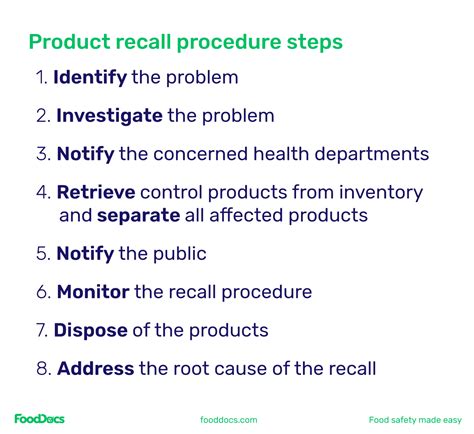Protecting Consumers and Brands in a Digitized World
Food safety is paramount in the modern food industry. Consumers demand safe, high-quality products, and businesses have a legal and ethical obligation to ensure their products meet these standards. In the age of globalization and e-commerce, food recall procedures have become increasingly complex and critical to safeguard public health and maintain brand reputation.

Key Statistics:
- In the US, an estimated 1 in 6 Americans (48 million people) get sick from foodborne illnesses annually.
- Food recalls cost the US food industry billions of dollars each year.
- In 2022, the US Food and Drug Administration (FDA) announced over 500 food recalls, affecting millions of pounds of products.
5 Golden Rules for Food Safety and Recall Procedures
1. Implement a Comprehensive Food Safety Plan:
Develop and maintain a written food safety plan that outlines all aspects of food handling, from receiving and storage to preparation and distribution. The plan should include procedures for monitoring, testing, and verifying safety at every stage.
2. Train Staff and Suppliers:
Regularly train all employees handling food on best practices for food safety. Ensure suppliers adhere to your food safety standards through contracts and audits.
3. Establish Traceability and Recall Systems:
Implement traceability systems that allow you to track the movement of food products throughout your supply chain. Establish clear recall procedures that outline the steps to be taken in the event of a food safety incident.
4. Conduct Regular Inspections and Audits:
Conduct regular inspections of your facilities, equipment, and food products. Hire a qualified third-party auditor to conduct independent assessments to ensure compliance with food safety regulations.
5. Communicate Effectively:
Communicate clearly and effectively with consumers, stakeholders, and regulatory authorities in the event of a food recall. Provide accurate and timely information to minimize public health risks and damage to your brand.
Transition to Digital Recall Procedures
In the digital age, traditional recall procedures can be slow and inefficient. Consider adopting technology solutions such as:
- Blockchain: Immutable record-keeping for traceability and supply chain transparency.
- Rapid Notification Systems: Automated alerts and notifications to consumers and stakeholders in the event of a recall.
- Centralized Recall Management Platforms: Coordinated recall management and communication across multiple channels.
Common Mistakes to Avoid in Food Recall Procedures:
- Delaying the recall: Acting too slowly can increase the risk to public health and damage to your reputation.
- Issuing an unclear or incomplete recall notice: Consumers need precise instructions on what products are affected and what actions to take.
- Failing to track recalled products: Inability to account for all affected products can lead to continued risks and legal liability.
- Ignoring social media: Negative comments and misinformation can spread rapidly on social media. Address concerns and provide accurate information promptly.
FAQs
1. What should I do if I suspect food poisoning?
- Contact a healthcare professional immediately.
- Keep a food diary to track what you ate before becoming ill.
- Report the incident to your local health department.
2. How can I avoid foodborne illnesses?
- Wash hands thoroughly before handling food.
- Cook meat and poultry to the proper temperatures.
- Refrigerate or freeze perishable foods promptly.
- Avoid cross-contamination between raw and cooked foods.
3. What is the FDA’s role in food safety?
- The FDA regulates food products in the United States, including setting food safety standards and responding to foodborne illnesses.
4. What are the consequences of violating food safety regulations?
- Civil and criminal penalties, including fines and imprisonment.
- Damage to brand reputation and consumer trust.
- Financial losses due to recalls and lawsuits.
5. What are some emerging trends in food safety?
- Precision farming and predictive analytics for early detection of foodborne hazards.
- Artificial intelligence and machine learning for automated food safety inspections and traceability.
- Blockchain technology for secure and transparent supply chain management.
Reviews
“This article provides invaluable insights into the critical nature of food safety and recall procedures.” – Consumer Advocate
“A comprehensive guide to safeguarding consumer health and protecting brand reputation in the digital food industry.” – Food Safety Expert
“Clear and concise information on the latest best practices for food safety management.” – Industry Consultant
“Empowering businesses with the knowledge and tools to navigate food recall procedures effectively.” – Regulatory Compliance Officer





















